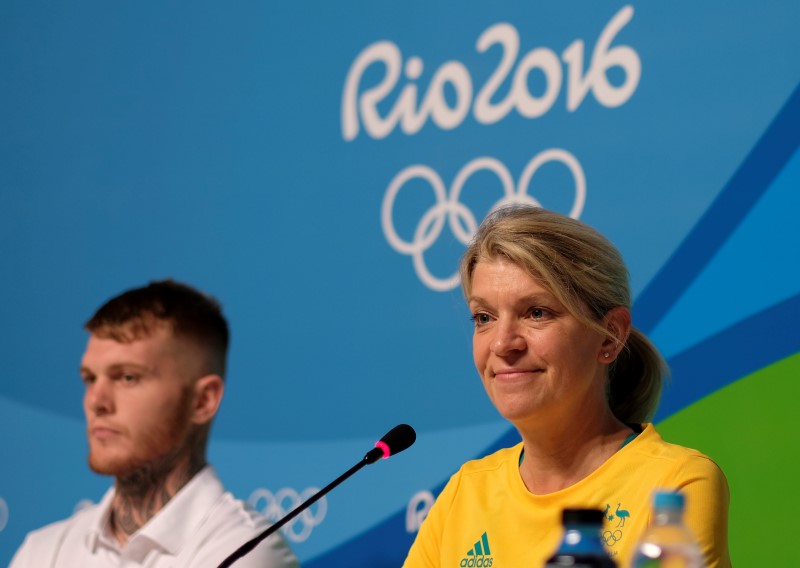By Daniel Flynn
RIO DE JANEIRO (Reuters) - Australia's Olympic delegation in Rio de Janeiro said on Monday that organizers had made "fantastic" progress in fixing problems with unfinished housing, although officials admitted that only two-thirds of the buildings had passed full safety checks.
Organizers for South America's first Olympic Games built 31 17-story buildings, but only 12 had been given the green light by Monday morning while another eight were in the process of receiving a full safety certification, Rio2016 spokesman Mario Andrada told Reuters.
"Twenty will be ready by today and 31 should be ready by Thursday," Andrada said, a full eight days before the opening ceremony.
The admission came a day after Australia's delegation said it would not move into the Olympic Village because it was "not safe or ready," citing deficiencies like "blocked toilets, leaking pipes and exposed wiring." [nL4N1AA0G3]
The litany of grievances from Australia, which moved members of its delegation into nearby hotels, revived concern over Brazil's readiness to host a major sporting event in the midst of its worst recession in decades and a deep political crisis.
New Zealand and Italy's delegations both said they had been forced to fix problems with electricity and plumbing, while Argentina said on Monday it had reserved accommodation outside the village for part of its delegation.
The Dutch team said their own staff had resolved many of the issues that beset their building, but they threatened to seek financial compensation for their work.
"We will evaluate this situation with IOC and Rio 2016 after the Games," Chief of Mission Maurits Hendriks, said in a statement issued on Sunday night. "This applies, for example, to financial consequences as a result of the measures we are taking and have been taken."
However, the head of the Australian Olympic team, Kitty Chiller, thanked organizers on Monday for responding promptly to her concerns by deploying hundreds of maintenance people and cleaners.
"There was fantastic progress made today," Chiller told a news conference in the Olympic media center. "It's looking like, according to our plan, we will be able to move everybody in on Wednesday."
The newly built village will host more than 18,000 athletes, officials, staff and volunteers over the Aug. 5-21 Olympics and the Sept. 7-18 Paralympics.
Chiller said her team had identified some 200 problems with the accommodation at the weekend - including water running down the walls, dirty floors and a strong smell of gas - but the list was now down to single figures.
Australia, which finished eighth in the medals table in London four years ago, is to bring 410 athletes for the games. It received three of its floors in the athletes accommodation on Monday, and it expects to receive the rest of the 15 floors by Wednesday, Chiller said.
Australian Shelley Watts, competing in the 60-kg female boxing category, said she had been impressed by the official accommodation when she arrived on Monday.
“It looks absolutely amazing. I haven’t had to concern myself with any of the leakages of the water or anything, but walking in there I just couldn’t wipe the smile off my face,” she said. “What Rio has done to be able to create this facility is amazing.”
MEMORIES OF WORLD CUP As many as 500,000 visitors are expected to travel to Brazil for the Games, many of them from the United States. Worries about security, the Zika virus and Brazil's economic crisis could discourage some travelers and VIP guests. Around 28 percent of Olympic tickets have yet to be sold.
The problems at the village are not unlike those that have occurred before other big spectacles in Brazil, such as the 2014 World Cup, when stadium crews were still wielding paint brushes and screwdrivers even minutes before kickoff.
The new subway line, which will connect the popular seaside neighborhoods of Copacabana and Ipanema to the Olympic facilities in Barra de Tijuca, has suffered repeated delays and is still undergoing tests despite a scheduled inauguration next Saturday.
Chiller said that a group of around 10 national Olympic committees - including Britain, New Zealand, Japan and Germany - had worked together to alert the local organizers and the International Olympic Committee (IOC) to problems at the village.
Rio's outspoken Mayor Eduardo Paes pledged to fix the problems, but had appeared to make light of the Australians' complaints by saying he would place a kangaroo in front of their accommodation to make them feel at home.
"The mayor and I have a date on Wednesday and I believe there will be a ceremonial handing over of the keys. I have arranged a little present for the mayor as well," Chiller said. "I still say that it will be the best village that I have ever been in once these issues are complete."

Chiller said the Australian team had paid the cost of putting its members in hotels and some initial cleaning costs to make its accommodation habitable. "We'll work out who pays the bill later on," she added.